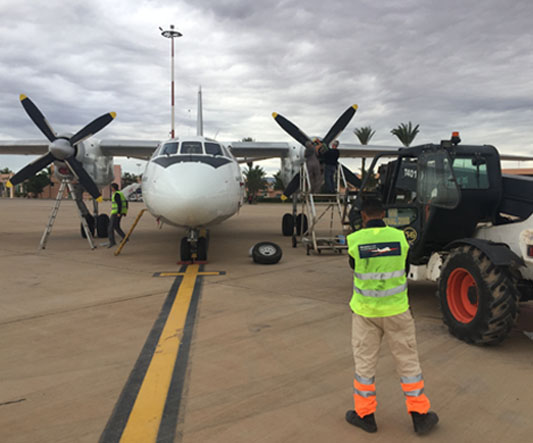
Daniel Danino is the CEO and founder of Volta Metals, an international group focused on energy, industry and trading in EMEA.

Morocco is a country that has been investing heavily in the aerospace sector in recent years, and the aviation industry is an important part of that effort.
As a part of this effort, the Moroccan government has been working to attract foreign investment and develop a skilled workforce in order to create a sustainable aerospace industry.
I would like to focus on the future of aviation in this region, particularly aircraft maintenance in Morocco, and how investors and others can take advantage of this emerging industry.
Factors Leading To Growth
The country has invested in the development of advanced industrial platforms, specialized training centers and infrastructure to attract both domestic and foreign investors.
With the increasing number of companies operating in Morocco, the demand for aircraft maintenance services has increased.
Several factors have contributed to this growth:
1. Strategic location. Morocco is strategically situated at the crossroads of Europe, Africa and the Middle East. This advantageous position allows the country to serve as a hub for various regional and international aviation activities.
2. Government support. The Moroccan government has actively supported the development of the aerospace industry, implementing initiatives and offering incentives to attract foreign investors. The government has also invested in infrastructure development, including the creation of aerospace industry clusters like the Midparc Free Zone near Casablanca.
3. Skilled workforce. Morocco has prioritized the development of a skilled workforce for the aerospace sector. The country has established specialized training institutions, such as the Moroccan Aerospace Institute, to produce a pool of skilled professionals to meet the industry’s needs.
4. Global partnerships. Morocco has established strong partnerships with leading aerospace companies, such as Boeing, Airbus, Bombardier, and Safran, which have set up manufacturing facilities in the country. These partnerships have not only contributed to technology transfer but I believe have also enhanced the overall competitiveness of the Moroccan aerospace sector.
Aircraft Maintenance In Morocco
The Moroccan government has also placed an emphasis on developing the infrastructure and resources necessary to attract maintenance, repair and overhaul (MRO) companies. The Technopark in Casablanca and Tanger Aerospace City are examples of Moroccan facilities catering to MRO companies, providing a suitable environment for operators to perform maintenance services.
Along with the already mentioned aviation companies, the region is attracting investments from a range of businesses, which is helping to establish a well-structured aviation ecosystem in the African region and provide easier access to services.
For instance, Aerotechnic, located in Agadir, provides a range of MRO services for short-range airlines, focused on their CFM56 engine capabilities with an EASA certification, catering to much-needed regional services for a variety of aircraft types. I see this move helping considerably to shift MRO from external maintenance providers to internal MRO services within the country.
Technology Adoption
Given that the aviation industry is a high-tech sector, investing in technology is integral to making strides in the aerospace industry. In Morocco, companies like Glassbox Technologies are using smart glasses and augmented reality (AR) to provide intelligent maintenance systems.
Tanger Tech, a newly established technology hub for aerospace, offers advanced technologies and facilities, which I believe will help bring in more advanced and skilled jobs.
Automating troubleshooting methods, implementing predictive maintenance strategies and adopting cloud-based solutions can help technicians and engineers increase overall productivity and reduce the time to rectify issues.
Training And Employment
Lastly, Morocco has implemented several training and development programs to strengthen the local knowledge economy. The “Aero-Industries Training Plan,” launched in 2014 by the Moroccan Aerospace Industries Association (GIMAS), provides specialized vocational training programs for technicians and engineers. In addition, some of the major MRO companies in Morocco have established training centers to enhance the skills of their workforce.
Taking Advantage Of These Opportunities
To take advantage of the opportunities in the Moroccan aviation and aerospace sector, businesses can consider the following approaches:
1. Capitalize on government initiatives. Leverage programs such as the “Aero-Industries Training Plan” to access a skilled workforce and benefit from the infrastructure provided by aerospace industry clusters like Midparc Free Zone, Tanger Tech and Technopark. These initiatives can provide a supportive ecosystem for businesses that want to establish their presence and grow.
2. Collaborate with local partners. Partner with local companies to tap into their expertise, resources and networks. This collaboration can help foreign businesses navigate the local business environment, regulations and cultural nuances.
3. Develop a strong supply chain. Establish relationships with suppliers and manufacturers in the region to ensure a stable and competitive supply chain. This can lead to cost savings, efficiency gains and improved product quality.
4. Invest in research and development (R&D). Engage in R&D activities to drive innovation and stay competitive in the rapidly evolving aerospace sector. I recommend you look to local research institutions and universities to access talent and resources.
5. Participate in regional trade events. Attend industry conferences, trade shows and exhibitions to showcase products, network with potential partners and stay informed about the latest industry trends and opportunities.
Conclusion
North Africa is witnessing fast-paced growth in the aviation industry in general, and I think Morocco is well-positioned to become a leader in aerospace manufacturing, maintenance and operations.
Through the country’s commitment to developing training programs, adopting new technology and improving infrastructure, I see Morocco positioning itself to become an attractive destination for aircraft maintenance services in particular.
Companies can take advantage of this burgeoning economy by capitalizing on government initiatives and tapping into a growing market of affordable MRO services.
___
Source here
